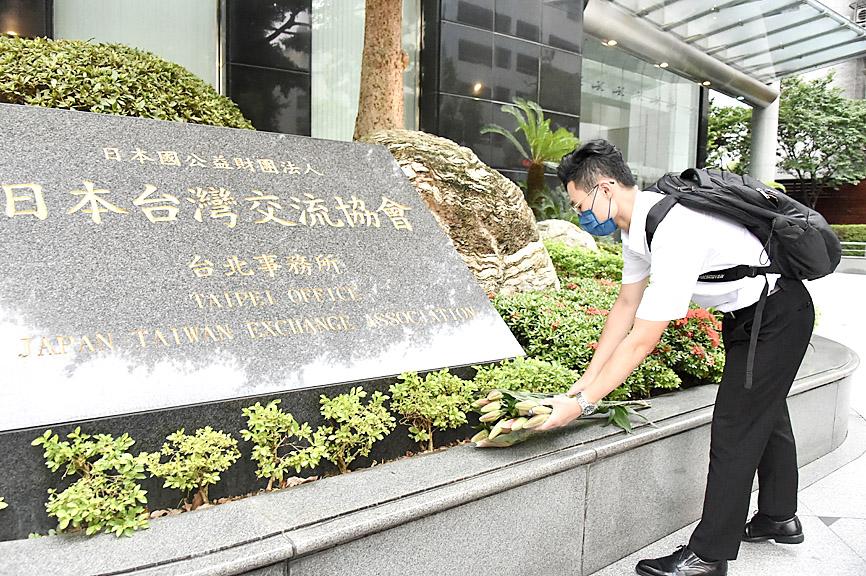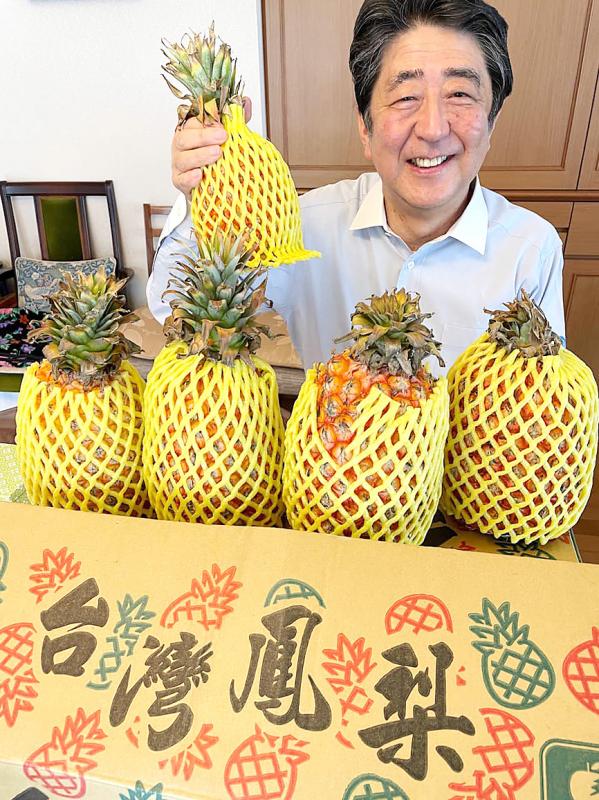Former Japanese prime minister Shinzo Abe, known for his pro-Taiwan stance, had always viewed Taiwan as an important friend to his country, regardless of whether he was in office, Taiwanese officials said yesterday.
Abe — who served two terms as prime minister from Sept. 26, 2006, to Sept. 26, 2007, and from Dec. 26, 2012, to Sept. 16, 2020 — died yesterday after he was shot while giving a speech.
Abe had always been on friendly terms with Taiwanese politicians and had visited the country several times.

Photo: Tu Chien-jung, Taipei Times
In 2010, Abe met with then-legislative speaker Wang Jin-pyng (王金平) with members of the All-Party Parliamentary Group of the Japanese Diet. When asked by reporters about the Diaoyutai Islands (釣魚台) — which are also claimed by Japan, where they are known as the Senkaku Islands — he said that “given Japan and Taiwan’s deep friendship, there are no unsolvable problems.”
Former president Ma Ying-jeou’s (馬英九) office issued a statement yesterday saying that he met with Abe at the Presidential Office in 2010 and 2011 during visits to Taiwan.
Establishing the Sapporo branch of the Taipei Economic and Cultural Representative Office in Japan in 2009, resuming direct flights between Taipei International Airport (Songshan airport) and Tokyo’s Haneda Airport in 2010, and signing the Taiwan-Japan Fisheries Accord in 2013 were major milestones in Taiwan-Japan relations and proof of Abe’s friendliness toward Taiwan, the office said.

Photo: screen grab from Twitter
During Abe’s second term, he said that “Taiwan is Japan’s friend” when answering inquiries from the Diet, and later said that “Taiwan is an important partner and friend, which shares [Japan’s] general values.”
Abe still closely followed Taiwanese issues after stepping down in 2020, notably saying in February that a “Taiwan emergency is a Japan emergency,” and calling on the US to abandon its “strategic ambiguity” policy by declaring that it would defend Taiwan in the event of an attack.
Last year, Abe was instrumental in Tokyo donating 1.24 million doses of the AstraZeneca COVID-19 vaccine to Taiwan.
“Taiwan is Japan’s important, old friend. It’s only natural to provide vaccines when such a country is facing difficulties,” he said at the time.
Ten years before, Taiwan made the largest donation of money after a massive earthquake struck Japan on March 11, 2011, and the nation donated masks to Japan after the start of the COVID-19 pandemic in 2020, which Abe said that “Japan must not forget.”
In addition to befriending cross-party politicians, Abe’s friendly relationship with former president Lee Teng-hui (李登輝) is also well-known.
Lee’s daughter, Annie Lee (李安妮), yesterday said the Lee Teng-hui Foundation had planned to invite Abe to a seminar this month.
While Taipei and Tokyo lack official diplomatic ties, informal diplomatic relations are stronger than ever thanks to Abe’s support, Annie Lee said, adding that news of his assassination was “heartrending.”
Agriculture and Food Agency Director-General Hu Jong-i (胡忠一), who had been posted in Japan for several years, said that Abe and his brother Japanese Minister of Defense Nobuo Kishi used to attend national day celebrations arranged by the Taipei Economic and Cultural Representative Office in Japan, adding that Abe particularly loved Taiwanese fruit.
Pingtung County Commissioner Pan Men-an (潘孟安) wrote on Facebook that Abe strongly supported the county’s pineapples and groupers, and sent a letter to thank Pan in May after receiving pineapples grown in Pingtung.
Abe’s death was “was not only Japan’s loss, but a loss for the world,” Pan said.
Additional reporting by Yang Yuan-ting and Lo Hsin-chen

Taipei has once again made it to the top 100 in Oxford Economics’ Global Cities Index 2025 report, moving up five places from last year to 60. The annual index, which was published last month, evaluated 1,000 of the most populated metropolises based on five indices — economics, human capital, quality of life, environment and governance. New York maintained its top spot this year, placing first in the economics index thanks to the strength of its vibrant financial industry and economic stability. Taipei ranked 263rd in economics, 44th in human capital, 15th in quality of life, 284th for environment and 75th in governance,

The Sports Administration yesterday demanded an apology from the national table tennis association for barring 17-year-old Yeh Yi-tian (葉伊恬) from competing in the upcoming World Table Tennis (WTT) United States Smash tournament in Las Vegas this July. The sports agency said in a statement that the Chinese Taipei Table Tennis Association (CTTTA) must explain to the public why it withdrew Yeh from the WTT tournament in Las Vegas. The sports agency said it contacted the association to express its disapproval of the decision-making process after receiving a complaint from Yeh’s coach, Chuang

Control Yuan Secretary-General Lee Chun-yi (李俊俋) tendered his resignation last night, admitting that he had misused a government vehicle, as reported by media. His resignation was immediately accepted by the Control Yuan. In a statement explaining why he had resigned, Lee apologized for using a Control Yuan vehicle to transport his dog to a pet grooming salon on May 20. The issue first came to light late last month, when TVBS News reported that Lee had instructed his driver to take the dog to the salon. The news channel broadcast photos that it said were taken by an unnamed whistle-blower, which purportedly showed the

A former officer in China’s People’s Liberation Army (PLA) who witnessed the aftermath of the 1989 Tiananmen Square massacre has warned that Taiwan could face a similar fate if China attempts to unify the country by force. Li Xiaoming (李曉明), who was deployed to Beijing as a junior officer during the crackdown, said Taiwanese people should study the massacre carefully, because it offers a glimpse of what Beijing is willing to do to suppress dissent. “What happened in Tiananmen Square could happen in Taiwan too,” Li told CNA in a May 22 interview, ahead of the massacre’s 36th anniversary. “If Taiwanese students or